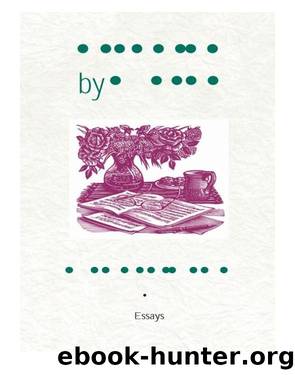Standing by Words by Wendell Berry

Author:Wendell Berry
Language: eng
Format: epub
Publisher: Counterpoint
Published: 2011-08-10T00:00:00+00:00
Where does this state of poetry stand us in looking at the great poets of the past? It obviously must greatly diminish their influence, since their poemsâunless we count the fairly recent pastâare not âautonomousâ and cannot be understood on the assumption that they are. But it also makes it difficult for us to see and appreciate what it means that their poems were not meant to be âautonomous.â
I believe that at the source of our poetry is the idea that poetry must be used for something, must serve something, greater and higher than itself. It is a way to learn, know, celebrate, and remember the truthâor, as Yeats said, to âBring the soul of man to God.â3 And Yeats was never less âsillyâ or eccentric than when he said that; he was speaking out of the traditional mainstream.
To Dante, The Divine Comedy is not his ambition, much less an âart objectââit is a blessing and a trial, a privilege and an obligation. By his merit as man and poet, but also necessarily by Godâs will and grace, he attains a vision of the truth, which then, by virtue of his poetic merit, he is underobligation to tell, so that, as the Apostle James says to him, âyou may strengthen in yourself and others the Hope which there below rightly enamors....â 4 There is no denying Danteâs ambition to be a great poet; there was, as he acknowledges, a heavy dross of pride in him. But we must be careful, for with these old poets there is always a sense in which their desire for fame is a desire, not to be âfamousâ as we understand that word, but to be worthyâa sense in which the desire to be a great poet follows logically from the attempt on, the gift of, a great subject. It is an ambition required by humility; what a damning presumption it would be to write less than greatly on a great subject! How blasphemous to be willing to do so!
The same understanding applies to Milton, who in âLycidasâ defines poetic ambition (desire for âfameâ) in two almost opposite senses. In the first, âfameâ is a good worldly reputation which, if earned and deserved, is of some value, though its value is limited and subject to chance and mortality. The other sense is absolute, and has to do not with âreputationâ but with worthiness:Fame is no plant that grows on mortal soil,
Nor in the glistering foil
Set off to thâworld, nor in broad rumor lies,
But lives and spreads aloft by those pure eyes
And perfect witness of all-judging Jove;
As he pronounces lastly on each deed,
Of so much fame in Heavân expect thy meed.5
Download
This site does not store any files on its server. We only index and link to content provided by other sites. Please contact the content providers to delete copyright contents if any and email us, we'll remove relevant links or contents immediately.
Cecilia; Or, Memoirs of an Heiress — Volume 1 by Fanny Burney(31348)
Cecilia; Or, Memoirs of an Heiress — Volume 3 by Fanny Burney(30946)
Cecilia; Or, Memoirs of an Heiress — Volume 2 by Fanny Burney(30905)
The Lost Art of Listening by Michael P. Nichols(6481)
We Need to Talk by Celeste Headlee(4879)
Asking the Right Questions: A Guide to Critical Thinking by M. Neil Browne & Stuart M. Keeley(4591)
On Writing A Memoir of the Craft by Stephen King(4220)
Dialogue by Robert McKee(3589)
I Have Something to Say: Mastering the Art of Public Speaking in an Age of Disconnection by John Bowe(3518)
Pre-Suasion: A Revolutionary Way to Influence and Persuade by Robert Cialdini(3421)
Elements of Style 2017 by Richard De A'Morelli(2945)
The Book of Human Emotions by Tiffany Watt Smith(2776)
Good Humor, Bad Taste: A Sociology of the Joke by Kuipers Giselinde(2558)
Name Book, The: Over 10,000 Names--Their Meanings, Origins, and Spiritual Significance by Astoria Dorothy(2494)
Fluent Forever: How to Learn Any Language Fast and Never Forget It by Gabriel Wyner(2449)
The Grammaring Guide to English Grammar with Exercises by Péter Simon(2397)
Why I Write by George Orwell(2362)
The Art Of Deception by Kevin Mitnick(2301)
Don't Sleep, There Are Snakes by Daniel L. Everett(2220)
